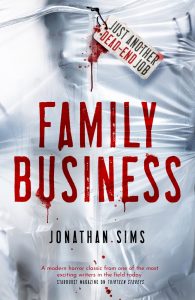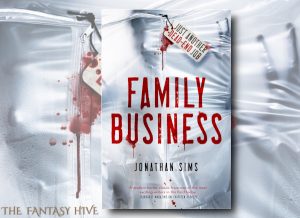FAMILY BUSINESS by Jonathan Sims (BOOK REVIEW)
“I know something’s been happening to you. You’ve had… There’s something you really need to know about the family business.”
Jonathan Sims is a writer, performer and games designer whose work primarily focuses on the macabre, the grotesque, and the gentle touch of creeping dread. He is the mind and the voice behind acclaimed horror podcast The Magnus Archives, as well as story-game design duo MacGuffin & Co., and some of your favourite nightmares. He lives in Walthamstow with the two best cats and an overwhelming backlog of books that he really should get round to.
From Jonathan Sims, Author of the Modern Horror Classic Thirteen Storeys, comes a new and exciting novel. Riddled with raw emotion, and the familiar twangs of grief and guilt, Sims has the irrefutable skill to force his readers to confront their darkest thoughts and fears, delving deep and forcing a confrontation of universal terror. In particular, the fear of being completely and totally forgotten.
‘Then feed me the forgotten, Frank. Let me help make this world cleaner for the living.’
 Diya is grieving. Angie, her best friend and roommate for over ten years recently died in their flat, and she is not coping well. Following an outburst at work, she lost her job, and has been merely existing in the flat she had once shared with her friend. Slough and Sons, a company that specialise in cleaning up after someone dies, helped Diya in the days following Angie’s death. The patriarch of this family business, Frank, saw something in Diya that he liked, so he offered her a job. Wanting a fresh start and needing to pay rent, Diya accepted the offer. Ready to roll up her sleeves and start cleaning up after the dead with Frank and his children, Mary and Xen.
Diya is grieving. Angie, her best friend and roommate for over ten years recently died in their flat, and she is not coping well. Following an outburst at work, she lost her job, and has been merely existing in the flat she had once shared with her friend. Slough and Sons, a company that specialise in cleaning up after someone dies, helped Diya in the days following Angie’s death. The patriarch of this family business, Frank, saw something in Diya that he liked, so he offered her a job. Wanting a fresh start and needing to pay rent, Diya accepted the offer. Ready to roll up her sleeves and start cleaning up after the dead with Frank and his children, Mary and Xen.
‘We do not disappear after death. Small pieces of our being can remain, persisting in those places that were once so meaningful to us’
The first thing one notices in the pages of Family Business, is Sims’ ability to construct imagery and topography. He manages to capture the essence of what one might imagine as ‘loneliness,’ imprinted into a dwelling. From the dirty backpack of a homeless man who died in a pub yard, to the rusted features of a house of a hoarder, or the barren and impersonal house of someone lost in the half-way house / asylum system (the writing is aptly ambiguous), Sims makes the very life of the lonely and forgotten disposable, and able to be wiped away with cleaning products and barely a second thought. The descriptions are so vivid and real that you can almost smell the rooms that he describes, which is rarely a good thing within this novel, but it packs a realist-punch. However, the eerie hyper-realism of this novel’s settings helps to build up the horror of the narrative, whilst supernatural happenings begin leaking through the mundane descriptions of old wallpaper and forgotten personal artefacts, the disposability of human life and lack of emotive response from the death-cleaners is uncanny and uncomfortable.
‘“Death Pays,” she mumbled to herself.
Which was good, because right now it was all she had.’
The characters Sims introduces us to are not the most likable, or even relatable, but they are believable. From the irritating attitude of the Slough’s surrounding death or the dead, to Diya’s constant self-doubt, the novel does not shine a kind light on people. Positivity is not something one can glean from the narrative with ease, I dare you to try. That being said, plenty of empathy can be found on these pages, if you take the time to find it.
“Some people aren’t worth as much as others”
As I have hinted, there is a supernatural element within this novel. This element leads to many unanswered questions but, for me, Sims’ supernatural being, ‘Mr Bill’, (who’s story I shall not spoil here) shares attributes and habits with the ancient creature who haunts Kathryn Foxfield’s ‘Good Girls Die First.’ Like Foxfield’s ancient demon-like creature, Mr Bill requires someone to do something for him so he can feed. Foxfield’s creature constantly searches for ‘The One’ and when The One has been found the creature feeds off of their guilt, whilst Mr Bill requires the forgotten, the lonely, and the Slough Family so he might feed. The similarities, for me, were unavoidable, but did not negatively impact the narrative at all.
The blood never mattered. Only the job. The job must be done, and I need someone who can do it.
Sims has built up a believable and creative narrative, nestled within the familiar setting of what many of us will recognise as ‘home.’ Each constructed home being unique, and comfortable in their own distinct way. Sims’ latest novel is a triumph, thriving on relatable fears, hyper-realistic dirty homes, and understandable grief. This novel has the momentum of a train with no breaks, and the correct amount of gore that manages to horrify you whilst also making you to want to read more, leading you to devour every page greedily, like Mr Bill devours the forgotten.
“I AM HUNGRY I AM HUNGRY I AM HUNGRY I AM HUNGRY I AM HUNGRY I AM HUNGRY I AM HUNGRY I AM HUNGRY I AM HUNGRY I AM HUNGRY I AM HUNGRY I AM HUNGRY”

